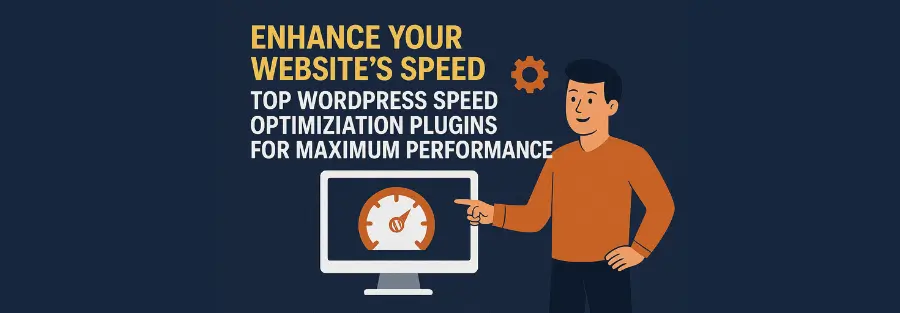In today’s fast-paced digital world, a slow website is a death sentence. Visitors are impatient, search engines penalize slow sites, and conversions plummet. Fortunately, if you’re using WordPress, you have a powerful weapon in your arsenal: WordPress speed optimization plugins. This guide will walk you through why website speed matters, the key areas for optimization, and the best plugins to help you achieve lightning-fast performance. Get ready to transform your website from a sluggish crawl to a blazing-fast experience!
Why Website Speed Matters for WordPress speed optimization
Website speed isn’t just about aesthetics; it’s a critical factor that impacts your entire online presence. Let’s delve into why you should prioritize it.
The Impact on User Experience
Imagine landing on a website that takes ages to load. Frustrating, isn’t it? Slow loading times lead to high bounce rates – visitors quickly leaving your site. A good user experience is crucial for retaining visitors and encouraging them to explore your content. Fast websites keep people engaged, make them more likely to browse multiple pages, and increase the chances of them returning.
Search Engine Ranking Benefits
Google and other search engines consider website speed as a crucial ranking factor. Faster websites rank higher in search results, leading to increased organic traffic. Google’s algorithms favor sites that provide a great user experience, and speed is a major component of that. Improving your website’s speed is a direct investment in your SEO strategy.
Conversion Rate and Revenue Gains
Slow websites directly impact your bottom line. Studies show that even a one-second delay in page load time can significantly decrease conversion rates. Whether you’re selling products, generating leads, or providing information, a slow website will cost you money. A faster website improves user experience, boosts SEO, and improves your overall revenue.
Key Areas for WordPress Speed Optimization
Optimizing your WordPress website speed involves focusing on several key areas. Here are the most critical:
Image Optimization: A Major Factor
Images often make up the bulk of a webpage’s size. Large, unoptimized images significantly slow down loading times. Compressing images, choosing the right file format (JPEG, PNG, WebP), and using responsive images that adjust to different screen sizes are crucial for image optimization.
Caching: Serving Content Faster
Caching involves storing static versions of your website’s pages and assets so they can be served to visitors more quickly. This reduces the load on your server and drastically speeds up loading times. Caching is one of the most effective methods for improving website speed.
Code Minimization: Reducing File Sizes
Your website’s code (HTML, CSS, and JavaScript) can be bulky. Code minimization involves removing unnecessary characters (spaces, comments, etc.) from your code files to reduce their size. Smaller files load faster.
Database Optimization: Cleaning Up the Clutter
Over time, your WordPress database can accumulate unnecessary data, such as post revisions, spam comments, and orphaned data. Regularly optimizing your database by cleaning this data can significantly improve your website’s performance.
Top WordPress Speed Optimization Plugins
Now, let’s dive into some of the best WordPress speed optimization plugins available. These plugins will help you tackle the key areas mentioned above.
Caching Plugins: The Core of Speed
Caching plugins are essential for any WordPress website. They dramatically improve loading times by serving cached versions of your pages.
WP Rocket: Features and Benefits
WP Rocket is a premium caching plugin known for its ease of use and powerful features. It offers page caching, browser caching, database optimization, and lazy loading, all in a user-friendly interface. It’s a great option for both beginners and advanced users.
LiteSpeed Cache: Features and Benefits
LiteSpeed Cache is a free plugin specifically designed to work with LiteSpeed web servers. It boasts powerful caching features, image optimization, and database optimization. If you’re using a LiteSpeed server, this plugin is an excellent choice.
WP Super Cache: Features and Benefits
WP Super Cache is a popular free caching plugin developed by Automattic (the company behind WordPress). It’s easy to set up and offers a good balance of features and simplicity. It generates static HTML files of your website to serve to users, making your site load faster.
Image Optimization Plugins: Squeezing Images for wordpress speed optimization
Image optimization plugins automatically compress and optimize your images, significantly reducing file sizes.
Smush: Features and Benefits
Smush is a free image optimization plugin by WPMU DEV. It offers lossless compression, bulk optimization, and lazy loading. It’s a user-friendly option for optimizing images directly within your WordPress media library.
Imagify: Features and Benefits
Imagify is a premium image optimization plugin that offers powerful compression algorithms. It optimizes images in different ways (lossy, lossless, and intelligent compression) and also includes WebP conversion and automated optimization features.
ShortPixel: Features and Benefits
ShortPixel is another popular image optimization plugin with both free and premium options. It provides lossy and lossless compression, WebP conversion, and the ability to optimize images in your media library and off-site images. It is an excellent choice for anyone wanting to compress all their images and make their website load faster.
Other Useful Speed-Boosting WordPress speed optimization Plugins
These plugins offer additional speed optimization features, such as code minimization and lazy loading.
Autoptimize: Features and Benefits
Autoptimize focuses on optimizing your website’s code. It combines CSS and JavaScript files, minifies them, and allows you to defer the loading of scripts to improve page loading speed. It can also optimize your images.
Asset CleanUp: Page Speed Booster: Features and Benefits
Asset CleanUp allows you to control which CSS and JavaScript files are loaded on each page of your website. This helps remove unnecessary files, reduces page size, and improves loading times. This is helpful for more advanced users.
Lazy Load by WP Rocket: Features and Benefits
Lazy Load by WP Rocket is a plugin that lazy loads images and videos, which means they only load when they are visible in the user’s viewport. This greatly reduces the initial page load time.
Choosing the Right WordPress speed optimization Plugins for Your Site
Selecting the right WordPress speed optimization plugins is crucial for maximizing your website’s performance. Here’s how to make the right choices:
Assessing Your Specific Needs
Before choosing plugins, consider your website’s specific needs. Do you have a lot of images? Then an image optimization plugin is a must. Are you using a LiteSpeed server? Then the LiteSpeed Cache plugin is your best option.
Compatibility Considerations
Ensure that the plugins you choose are compatible with your WordPress theme and other existing plugins. Test the plugins in a staging environment before implementing them on your live site to avoid any conflicts.
Testing and Monitoring Performance
After installing and configuring plugins, always test your website’s speed. Use tools like Google PageSpeed Insights, GTmetrix, or Pingdom to measure your website’s performance before and after implementing changes. This will help you monitor the impact of the plugins and make adjustments as needed.
How to Implement and Configure Plugins
Here’s a quick guide to getting started with your chosen speed optimization plugins:
Step-by-Step Plugin Installation
- Go to your WordPress dashboard.
- Click on “Plugins” -> “Add New”.
- Search for the plugin you want to install.
- Click “Install Now” and then “Activate”.
Initial Configuration Tips to start WordPress speed optimization
Each plugin has its own settings and configuration options. Follow the plugin’s documentation or tutorial videos. Start with basic settings, like image compression and caching, and then experiment with more advanced features. Don’t forget to clear your website’s cache after any setting adjustments.
Ongoing Maintenance and Updates
Keep your plugins updated to the latest versions to ensure optimal performance and security. Regularly review your website’s speed and make adjustments to your plugins as needed.
Conclusion
Improving your website’s speed is an ongoing process, but it’s a worthwhile investment. By leveraging the power of WordPress speed optimization plugins, you can significantly improve your website’s loading times, enhance user experience, boost search engine rankings, and ultimately drive more conversions.
By implementing the plugin recommendations above, you can dramatically enhance your website’s speed and enjoy the benefits of a faster, more efficient online presence.
Are you ready to optimize your website speed? Start experimenting with these plugins today and experience the difference, want us to do it for you Let’s connect!





